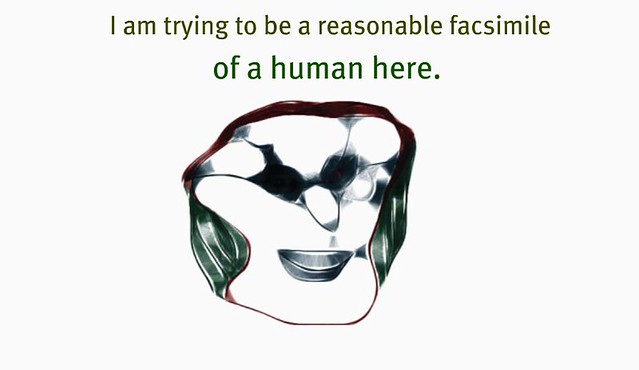
What am I doing to spread reason today? That's an excellent question and one I'm trying to ask myself regularly. Today, I'm writing and/or sharing the post you are now reading.
Being more reasonable is not something that happens to us out of the blue (or in response to prayer); it is something we have to work at. Assuming we make the decision that we would like to be more reasonable, what can we do to be more reasonable in our daily interactions with others? First, we can learn some simple truths about the world. But that's the easy part because most of us already know many such truths. The second and far more difficult challenge for us is that we must learn to catch ourselves as we repeatedly violate these truths so that we can change our behavior. In this brief post, I'll explain what this looks like.
Let's start with one simple truth:
How strongly I feel about a particular issue is a poor indicator of the likelihood that I am right about the particular issue.
I think that most of us would agree with this, at least in principle. The fact that I am really passionate or fired up about something doesn't mean I'm any more likely to be correct about it. We can all think of cases where others (and hopefully ourselves) have been extremely committed to an idea, position, claim, or whatever else that turned out to be wrong.
The challenge here is that this particular truth is easy to overlook when it comes to our opinions, beliefs, and attitudes. This is especially difficult when we are engaged in an argument with someone advocating for a different position. In the moment, it is easy to conclude that we must be right because what we are saying feels right. This is a mistake.
To be more reasonable, we must learn how to catch ourselves in the moment when we are making that mistake and remember this truth. And that means that we must learn to catch ourselves when we are under pressure and in the midst of a strong emotional reaction. Initially, we are likely to fail at this. The good news is that we can learn it if we are willing to invest some effort.
The first step is usually to learn to catch ourselves after the fact. Suppose I get into a Twitter argument with someone and end up pushing my position by relying largely on the intensity of my emotional attachment to an idea rather than anything reasonable. Instead of offering evidence to support my position or providing sound reasoning that would allow the other party to see how I arrived at my position, I start from the assumption that I'm right because no good person could possibly hold a different opinion from the one I hold. If I am new to this, I am unlikely to catch myself doing this during the argument; however, I might realize I've done it afterward. If I decide I'd like to be more reasonable, I could wait until I've calmed down and then do some critical evaluation of how I behaved. From this more clear-headed perspective, I may realize my mistake.
With enough practice, these after-the-fact analyses often have an interesting effect: I begin to catch myself earlier and it becomes easier to do so. Eventually, I start catching myself during the argument. No, this probably isn't going to happen 100% of the time. I'll still make mistakes. But as I begin to catch myself during the argument and have the opportunity to be more reasonable in that context, it becomes progressively easier. As I begin to behave more reasonably in my interactions with others, I find that I am calmer, slower to anger, think more clearly, and far less likely to feel guilty for something I said while upset.